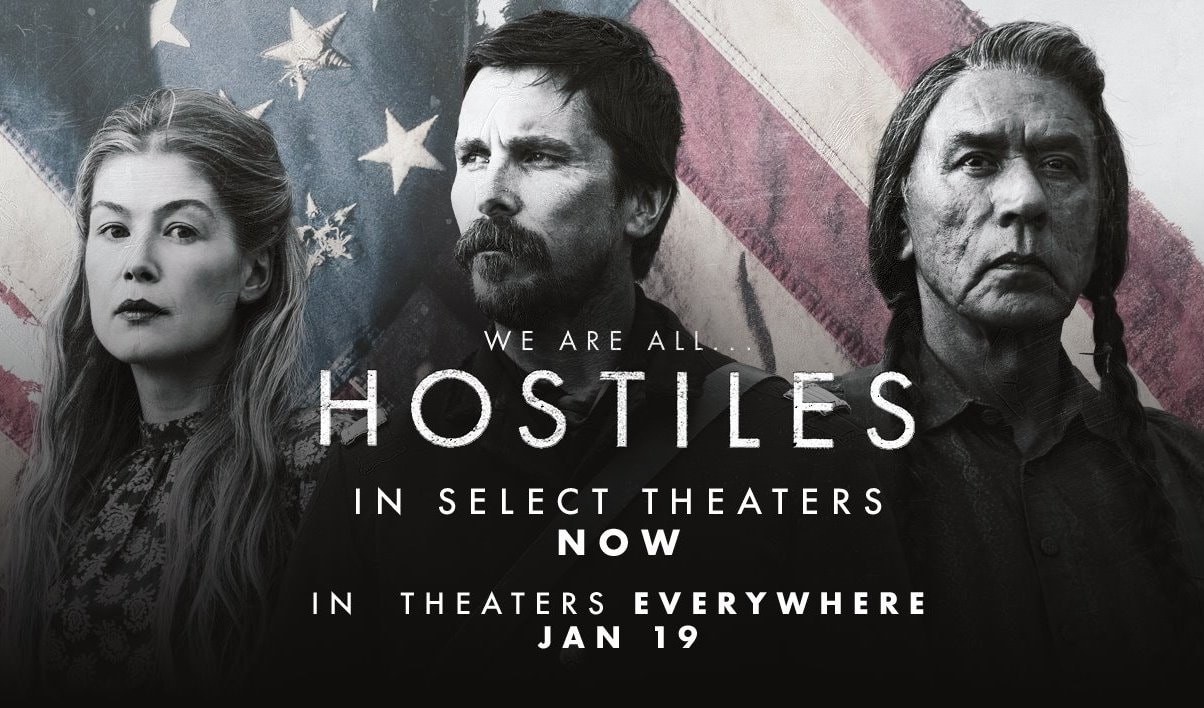
Hostiles is a classic western, and addresses the classic western themes of captivity and savagery.
At its core, Hostiles is essentially a captivity narrative. The plot centers on the primary captivity of the aging Cheyenne Chief Yellow Hawk (Wes Studi) and his family, who have been held prisoner for 7 years. Yellow Hawk is now near death and has been granted his request to be returned to his native homeland to die, and his long time nemesis Capt. Joseph J. Blocker (Christian Bale) is assigned the detail. But the movie does a marvelous job of examining all manner of captivities for many of the characters.
Capt. Blocker says in an early scene that “every time we lay our heads down out here, we’re prisoners,” and indeed, this remark proves prophetic. Chief Yellow Hawk is a literal captive, being escorted in chains, and in turn Capt. Blocker is held captive by his duty and obligation to escort and protect his sworn enemy. Sgt. Charles Willis (Ben Foster) is literally a prisoner, and in spite of being a U.S. soldier he finds himself held in a captivity even more severe than the “savages” he’s traveling with.
Rosalie Quaid (Rosamund Pike) is held captive by the trauma she endures in the opening scene, and Capt. Blocker and his entire detail are held captive by their duty to assist her. Msgt. Thomas Metz (Rory Cochrane) is held captive by his “melancholia.”
And finally, the entire detail is held captive by the savage Comanche who threaten them throughout the film. This captivity is central to the overall theme and connects viewers to the theme of savagery, which permeates the film.
The film destabilizes the issue of savagery almost immediately with the character of Jeremiah Wilks (Bill Camp), a Harper’s Bazaar writer who asks Capt. Blocker if it’s true that he has taken more scalps than Crazy Horse himself. Capt. Blocker defines Chief Yellow Hawk’s savagery by his brutal treatment of foes and prisoners, but it quickly becomes apparent that the Capt. has as brutal a history as his opponent, begging the question of how savagery is defined.
Savagery is clearly demonstrated in the opening scene by the Indian attack, and when Mrs. Quaid is brought to the Army detail’s camp, she is upset by the appearance of the native prisoners - they are racially identified as “savage.” But shortly thereafter, the wife reaches out to her, and her status as a savage is destabilized through her charitable action.
In the same vein, when the entire party is threatened by the Comanche, the Cheyenne Chief Yellow Hawk tells Capt Blocker that “these people are rattlesnake people” and are dangerous, that they will not discriminate, and will kill them all. Yellow Hawk’s message to Capt. Blocker throughout the film is that they must work together against a common enemy.
Their Army prisoner Sgt. Charles Willis (Ben Foster) appeals to the Capt.’s sense of common enemies in a different way, pleading for mercy and arguing that his guilt is no greater than the Capt.’s or any other Army soldiers’ from that time. His argument is that they are all guilty, essentially that they are all savages, and it is hypocritical to condemn him for crimes that are fundamentally no different from what others have committed, yet he should hang while others go free. Capt. Blocker says only “I was doing my job,” thus falling back on his commitment and the captivity of his will and conscience to the demands of his duty, wholly sidestepping the question of his savagery.
The definition of “savage” is destabilized by several characters across several scenes, and in fact the movie directly addresses the “Indian question” through both its plot and the dialogue of several characters. I have seen various people on social media criticizing the film for its “liberal” bias, but I found their criticisms ill-founded. The dialogue representing differing perspectives on how natives should be treated by the govt, by the army, and who represents the real savage are all questions that were being actively debated in the late nineteenth century, and the film does justice to its characters, subject, and its viewers by presenting fully fleshed out characters facing a complicated period of history.
 RSS Feed
RSS Feed
